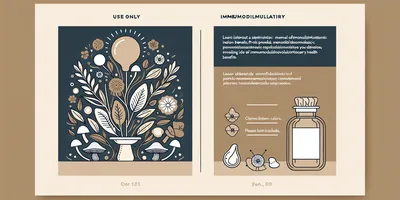Enoki Benefits (Flammulina filiformis)
Enoki (Flammulina filiformis) is an edible mushroom and medicinal mushroom.

Anti-Aging Benefits
Enoki mushrooms are more than just a tasty ingredient; they are a bundle of anti-aging treasures. The variety of bioactive constituents found in Enoki, such as glycoproteins, phenols, and sesquiterpenes, contribute to its many health benefits, including antioxidant properties that can combat the aging process.
These antioxidant compounds in Enoki have been the subject of research due to their potential to fight oxidative stress, which is a key factor in the aging of cells. The presence of natural antioxidants helps to protect the body's cells from damage caused by free radicals, which are linked to aging and various diseases.
The anti-aging effect of Enoki is also associated with its reported memory and learning enhancements, providing a dual benefit to those looking to maintain cognitive health as they age. Moreover, beyond its direct effect on the aging process at the cellular level, Enoki's cholesterol-lowering effects give it a role in preventing age-related diseases such as atherosclerosis.
In summary, incorporating Enoki mushroom into the diet could be a delicious strategy to slow down the effects of aging and promote overall health. The continued scientific research into this culinary medicine, such as detailed in the paper "Golden Needle Mushroom: A Culinary Medicine with Evidenced-Based Biological Activities and Health Promoting Properties," supports its potential use in health promotion and disease prevention, making it a valuable addition to anti-aging dietary practices.
Learn about mushrooms with anti-aging benefits.

Anti-inflammatory Benefits of Enoki
The Enoki mushroom is not just a versatile culinary delight but also a potent source of health benefits, particularly in terms of its anti-inflammatory properties. Chronic inflammation is a common factor in numerous diseases, and managing it can play a critical role in health maintenance and disease prevention.
Studies have revealed that the bioactive compounds in Enoki possess anti-inflammatory properties that can help mitigate inflammatory processes in the body. These compounds, such as polysaccharides and phenols, function by modulating the immune system's response, leading to reduced inflammation and potential relief from associated conditions.
F. velutipes – the scientific name for Enoki – has been found to contain a wealth of bioactive constituents, as discussed in an extensive review of its health-promoting properties. This mushroom's extracts have displayed significant anti-inflammatory effects in both in vitro and in vivo studies. These beneficial impacts are essential for not just mitigating general inflammation but also in the context of specific conditions like atherosclerosis and other inflammatory-related disorders.
Incorporating Enoki mushrooms into the diet may therefore offer a natural and delicious way to harness these anti-inflammatory benefits, contributing to overall health and potentially reducing the risk of a range of inflammation-related diseases.
Learn about mushrooms with anti-inflammatory benefits.

Antioxidant Benefits
Enoki mushrooms are not only sought after for their distinctive taste and texture in culinary arts but also for their profound health benefits. A notable benefit of these elegant, thread-like mushrooms is their powerful antioxidant properties.
Antioxidants are vital for maintaining health and preventing diseases, as they protect the body by neutralizing harmful free radicals that can cause cell damage. Enoki contains bioactive compounds, including phenols and flavonoids, known for their strong antioxidant capabilities. Research highlights the isolation of these compounds from similar species, which exhibit antioxidant, anti-cancer, and anti-inflammatory activities.
In the context of skin health, investigations into Vitreoscilla filiformis have demonstrated how such extracts, akin to the bioactive elements found in Enoki mushrooms, can stimulate the skin's endogenous antioxidant defenses. Although V. filiformis in itself is not related to Enoki directly, the mechanism by which these bioactive entities impart their benefits provides a parallel in understanding the antioxidative impacts of Enoki's phytochemical profile.
Further reinforcing Enoki's status as a functional food, a comprehensive study on Flammulina velutipes points out the presence of glycoproteins and sesquiterpenes with strong antioxidant activity. The study validates traditional claims and opens up doors for potential drug development, harnessing the antioxidant power of Enoki mushrooms.
Regular intake of Enoki could, therefore, mitigate oxidative stress, contributing to the protection against a multitude of diseases associated with oxidative damage, ranging from premature aging to chronic inflammation and cancer. The continuous exploration into these biological activities underscores the potential for Enoki to enhance well-being as part of a balanced diet.
Learn about mushrooms with antioxidant benefits.

Antimicrobial Benefits of Enoki
Enoki mushrooms have been recognized for their potential antimicrobial properties, offering a natural and alternative method for fighting various pathogens. While the research on Enoki's antimicrobial capabilities is ongoing, studies on related compounds in other organisms show significant promise for health applications.
Compounds similar to those found in Enoki have been studied in other contexts for their robust antimicrobial effects. For instance, the review on Cassytha filiformis explored a range of phytochemicals including alkaloids, saponins, and others that exhibit prominent antimicrobial activity. This suggests that naturally-derived compounds from plants and fungi could be important for treating infectious diseases. Discover more about these phytochemicals and their antimicrobial potential.
Additionally, substances extracted from non-pathogenic bacteria, like those studied in Vitreoscilla filiformis, show how these extracts can soothe the skin, stimulate antimicrobial peptides, and help rebalance the skin's natural microbiota. These findings underscore the importance of similar antimicrobial agents that could be present in Enoki. They work not by directly destroying pathogens, but by enhancing the body's own defenses, a strategy that could potentially minimize adverse effects associated with conventional antibiotics. Learn how these extracts improve skin health.
In summary, the antimicrobial qualities of Enoki draw attention to the importance of studying natural products for health applications. Future research may further unveil how the compounds present in Enoki can contribute to the fight against infectious diseases, potentially leading to safer, effective, and more natural remedies.
Learn about mushrooms with antimicrobial benefits.

Anticancer Benefits of Enoki
Enoki mushrooms have emerged not only as a gourmet delight but also a source of potential cancer-fighting agents. Compounds within Enoki have shown promising effects in scientific studies, exhibiting properties that may help in the prevention and intervention of cancer development.
Key components such as carbohydrates, proteins, and phenolic compounds play a fundamental role in Enoki's anticancer activity. They are capable of inhibiting the proliferation of malignant cells and preventing the spread of cancerous tissues in the body. This has positioned Enoki as a complement to traditional cancer treatments, providing a nutritional approach to cancer management.
Enoki's arsenal against cancer extends beyond these compounds. Glycoproteins, sesquiterpenes, and other bioactive molecules present in the mushroom have been identified to contribute to its antitumor effects, making it a subject of interest for in-depth cancer research. The multifaceted nature of Enoki's bioactive components provides a broad attack against cancer, which may include mechanisms such as the induction of apoptosis in cancer cells and the inhibition of angiogenesis, essential for tumor growth.
Research into Enoki's anticancer effects is comprehensive, covering various potential benefits and mechanisms. For those interested in understanding the depth and scope of Enoki's capabilities to combat cancer, further reading is available. An insightful review, titled "Golden Needle Mushroom: A Culinary Medicine with Evidenced-Based Biological Activities and Health Promoting Properties," delves into the scientific evidence behind Enoki's health-promoting attributes, including its anticancer activities. The paper emphasizes the mushroom's nutraceutical prospects and is a testament to the growing interest in medicinal fungi as a source for novel anticancer therapies. You can read the full text of this research to gain a deeper insight into the anticancer benefits of Enoki by clicking here.
Learn about mushrooms with anticancer benefits.

Immunomodulatory Benefits
Enoki has been gaining attention not just for its culinary applications, but also for its potential health-promoting properties. Among the various beneficial aspects of this mushroom, its immunomodulatory effects stand out—allowing for modulation of the immune system, which can be crucial in maintaining overall health and combating diseases.
Research highlights the presence of bioactive constituents in Enoki, such as glycoproteins and sesquiterpenes, which contribute to its ability to regulate immune functions. The immunomodulatory capacity of Enoki involves the activation or suppression of various immune responses, ensuring that the body can respond effectively to pathogens, and minimize potential for chronic inflammation that might lead to disease.
A plethora of studies have suggested that Enoki may play a role in not only strengthening the body's defense mechanisms but also in modulating immune reactions, thereby upholding a balanced immune system. This balance is particularly relevant in mitigating conditions like autoimmune diseases, where the immune system's regulation is critical.
While the potential of Enoki in immune health promotion is promising, continued research is vital for unravelling the full scope of its benefits and effectual applications in medicine and nutrition.
Learn about mushrooms with immunomodulatory benefits.

Anti-cancer Benefits
Enoki mushrooms have been gaining attention for their potential anti-cancer properties. Various studies have highlighted the presence of compounds in Enoki that could play a role in cancer prevention and treatment. Specifically, phytochemicals such as flavonoids and alkaloids isolated from similar species have shown promise in pharmacological activities.
Research into the ethnobotany and phytochemistry of plants with similar compounds, like Cassytha filiformis, commonly known as Love Vine, provides insights into the anti-cancer potential of Enoki mushrooms. The review on Love Vine, which belongs to a different species but shares some phytochemical properties, suggests that these compounds exhibit significant antioxidant and anti-cancer activities. It is this type of evidence that supports the continuing research into Enoki mushrooms and their efficacy in combatting cancer.
Although direct studies on Enoki are essential for conclusive evidence, the existing literature on phytochemicals with anti-cancer capabilities presents a compelling case for its potential benefits. Encouraging results from other species underscore the importance of further investigation into Enoki's active compounds and their effects on cancer prevention and therapy.
Learn about mushrooms with Anti-cancer benefits.

Antitumor Benefits
Enoki has been the subject of extensive research due to its potential antitumor properties. The active constituents within Enoki have displayed promising anticancer activity in a range of studies. For example, its unique compounds like carbohydrates, proteins, and glycoproteins, have been observed to influence tumor growth.
A research paper titled "Golden Needle Mushroom: A Culinary Medicine with Evidenced-Based Biological Activities and Health Promoting Properties" highlights Enoki's bioactive compounds and their antitumor effects. Carbohydrates in Enoki, such as beta-glucans, have shown to exert immunostimulatory effects that can enhance the body's natural defense against the proliferation of cancer cells. By activating various immune cells, Enoki may play a vital role in the body's surveillance against tumors.
The beta-glucans in Enoki mushrooms are of particular interest due to their ability to activate immune responses that target cancerous cells. This immunomodulatory action makes Enoki a potential complementary approach alongside traditional cancer therapies, supporting the body’s fight against malignancies.
Furthermore, the research indicates that Enoki contains phenols and sesquiterpenes, which have been identified for their antioxidant activities. These antioxidants may contribute to the antitumor benefits by protecting cells from oxidative damage associated with cancer progression.
While more research is necessary to fully understand and harness Enoki's antitumor potential, it is evident that Enoki's bioactive compounds provide a multi-faceted approach to combating cancer cells and supporting the body's immune defenses. Continued scientific exploration into Enoki may uncover new methods of prevention and treatment for various forms of cancer.
Learn about mushrooms with antitumor benefits.

Hepatoprotective Benefits of Enoki
Enoki, beyond its culinary popularity, has shown remarkable potential in hepatic care. Substantial research indicates that this mushroom may play a key role in liver health, offering hepatoprotective effects. This is particularly important given the liver's critical role in detoxifying the body, metabolizing drugs, and processing nutrients.
Phytochemical compounds present in Enoki, such as carbohydrates, glycoproteins, and phenols, have been linked with protective activity against liver damage. These components contribute to the mushroom's antioxidant properties, which can mitigate oxidative stress—a common factor in liver diseases. The presence of these bioactive compounds underscores Enoki's therapeutic potential in preventing and treating liver disorders.
It is essential to continue the exploration of Enoki's health benefits as its bioactive constituents might offer an alternative approach to liver health management. Future research will no doubt further elucidate the mushroom's hepatoprotective mechanisms, with the aim of integrating it more comprehensively into dietary and medicinal practices.
Learn about mushrooms with hepatoprotective benefits.

Antihypertensive Benefits
Enoki is not only a versatile ingredient in the kitchen but also displays significant health benefits, particularly in managing blood pressure. Antihypertensive properties in Enoki have been attributed to the presence of various bioactive compounds in the mushroom that work synergistically to alleviate high blood pressure.
According to comprehensive research, the bioactive constituents—including carbohydrates, proteins, glycoproteins, phenols, and sesquiterpenes—found in Enoki, display promising antihypertensive effects. These effects are essential in the prevention and treatment of hypertension, a prevalent condition associated with an increased risk of cardiovascular diseases.This study highlights Enoki mushroom as a natural source of antihypertensive agents that could be a beneficial addition to a heart-healthy diet.
Furthermore, the range of biological activities identified, notably the anti-atherosclerotic and cholesterol-lowering effects, complement the antihypertensive function, providing a multifaceted approach to cardiovascular health. By integrating Enoki into daily nutrition, individuals may gain a dietary advantage that supports vascular health and blood pressure regulation.
Learn about mushrooms with antihypertensive benefits.

Antibacterial Benefits
Enoki mushrooms have been identified as a rich source of natural antibacterial agents. Compounds found within these mushrooms, such as phenols and sesquiterpenes, contribute to their ability to combat harmful microbes. Research highlights the potential of enoki in addressing a variety of bacterial infections, suggesting it as a promising candidate for the development of new antibacterial drugs.
These antibacterial properties are particularly pertinent in a time marked by an increase in antibiotic-resistant bacterial strains. The bioactive constituents in enoki exhibit a unique mode of action against bacteria that may differ from traditional antibiotics, potentially offering an alternative pathway to counteract resistance.
Moreover, enoki mushrooms are not only beneficial for their defensive antibacterial properties but also contribute positively to health by being a nutritious food source with numerous other beneficial effects, including cholesterol-lowering and immunomodulatory activities as outlined in a comprehensive study on their health-promoting properties.
Learn about mushrooms with antibacterial benefits.

Anti-diabetic Benefits
Enoki mushrooms have been recognized for their potential in aiding the management of diabetes. A review exploring the ethnobotany and phytochemistry of various plants, including Cassytha filiformis, highlighted the presence of phytochemicals that could be relevant to diabetes care. The highlighted phytochemicals, such as alkaloids and flavonoids, are thought to have therapeutic effects against diabetes. These compounds are known for their ability to modulate biological processes that are critical in diabetes management.
Alkaloids, one of the compounds found in the Enoki mushroom, have shown promise in pharmacological activities that could be beneficial for diabetics. They are known to influence the metabolism of glucose and insulin release, which can help in regulating blood sugar levels. Moreover, the presence of flavonoids contributes to the antioxidant properties of the mushroom, providing a protective effect against oxidative stress commonly associated with diabetes.
However, further in-depth research is necessary to cement Enoki's role in diabetes treatment fully. The review clearly suggests the potential of these phytochemicals, necessitating continued exploration into their effectiveness and mechanisms of action. For individuals looking to understand the detailed phytochemical composition and its implications on diabetes, the comprehensive review can be highly informative. Refer to the full research for extensive insights on the ethnobotanical and anti-diabetic properties of Enoki mushrooms.
Learn about mushrooms with anti-diabetic benefits.

Enhances Wound Healing
The Enoki mushroom harbors constituents that may hold potential in promoting the healing of wounds. A review of Vitreoscilla filiformis extract (Vfe), a derivative of a nonpathogenic bacterium closely related to compounds found in the Enoki mushroom, suggests that these extracts can support skin health akin to the effects of topical probiotics. Research demonstrates that Vfe can effectively soothe the skin, restore the barrier, and stimulate antimicrobial peptides—a set of functions pivotal for effective wound healing.
In addition to these skin-soothing and barrier-restoring properties, Vfe has been noted for its ability to rebalance skin microbiota without directly killing pathogens, instead enhancing the proliferation of beneficial skin bacteria such as Staphylococcus epidermidis. Vfe's antioxidative properties act by triggering the skin's natural antioxidant defenses, contributing to the healing process of skin wounds. Moreover, its anti-inflammatory effects and support in the formation of the skin's barrier through the promotion of keratinocyte proliferation make Vfe, and by extension, Enoki mushroom extracts, potentially beneficial for accelerating wound healing processes.
Further details of these studies outline the capability of Vfe to protect against UV-induced skin immune changes and speed up the renewal of the stratum corneum. It is instrumental in maintaining the integrity of the dermal-epidermal junction and in boosting the expression of key proteins and collagen in the skin, critical factors for wound repair and the overall promotion of skin health. The review of these findings underscores the potential role of Enoki mushroom components in modern skin care, particularly in areas concerning wound healing and skin barrier enhancement.
Learn about mushrooms with wound healing benefits.

Offers Anti-Trypanosomal Properties
Enoki mushrooms are not only a gourmet delight but also possess medicinal properties that can contribute to treating parasitic diseases. Intriguingly, research has shown that Enoki shares similar phytochemical profiles with other organisms used in traditional medicines, such as Cassytha filiformis, known as Love Vine. A comprehensive review on Ethnobotany and phytochemistry of Love Vine, which shares therapeutic parallels with Enoki, highlights the plant's historical use in treating trypanosomiasis among other ailments.
These shared qualities suggest a presence of bioactive compounds within Enoki, such as alkaloids and flavonoids, which exhibit significant anti-trypanosomal activity. This link underscores the potential application of Enoki in pharmacological research aimed at combating diseases caused by Trypanosoma species, responsible for conditions like sleeping sickness and Chagas disease.
While direct studies on Enoki’s anti-trypanosomal effects are essential for conclusive evidence, existing literature on related species encourages further exploration into Enoki's active compounds and their benefits. Research on Cassytha filiformis paves the way for scientists to consider Enoki mushroom as another promising candidate in the fight against parasitic infections.
Learn about mushrooms with anti-trypanosomal benefits.

Supports Cardiovascular Health by Vasorelaxation
Enoki mushrooms have been indicated for their potential cardiovascular benefits, particularly in the area of vasorelaxation, the process by which blood vessels widen to improve blood flow and reduce blood pressure. The pharmacological activities of compounds found in Enoki are reflected in their ability to promote vascular health.
Ethnobotanical studies have observed the use of similar compounds in traditional medicines, with research identifying a variety of phytochemicals with vasorelaxation properties. For instance, a comprehensive review on the ethnobotany and phytochemistry of Cassytha filiformis, which, like Enoki, contains compounds such as alkaloids and flavonoids, has shown efficacy in inducing vasorelaxation. These findings bolster the understanding of how the similar bioactive compounds in Enoki may be leveraged to support cardiovascular health.
Integrating Enoki into one’s diet could thus contribute to the modulation of blood pressure and enhancement of overall circulatory health. However, it is crucial to note that while these findings are promising, additional studies are needed to fully understand the scope and mechanism of the vaso relaxing effects attributed to Enoki mushroom.
Learn about mushrooms with vaso relaxing benefits.

Supports Kidney Health and Urination
Enoki mushrooms have been valued for their diuretic properties, assisting in detoxification and promoting kidney health. According to a comprehensive review on the phytochemistry of Cassytha filiformis, traditionally used herbal remedies exhibit significant diuretic effects, aiding in the excretion of excess fluids and potentially supporting the management of conditions like hypertension.
The review outlines how the phytochemical constituents of such plants, like alkaloids and flavonoids, contribute to the diuretic activity. These bioactive compounds may increase urine output, helping to cleanse the body of waste products and preventing fluid retention. While this review primarily focuses on Cassytha filiformis and the benefits of its phytochemicals, it highlights a broader understanding of how natural diuretic agents can support kidney health, a feature that is also attributed to Enoki mushrooms.
Given the potential positive impact on urinary function and kidney health, incorporating Enoki into one's diet could be beneficial for those looking to support their body's natural detoxification processes. However, as with any natural remedy, it's important to consume them in moderation and be aware of individual health conditions that might affect their suitability.
Learn about mushrooms with diuretic benefits.

Soothing Benefits for Skin
The use of natural ingredients for skin care has been a topic of growing interest in modern dermatology, and Enoki mushroom, or Vitreoscilla filiformis extract (Vfe), stands out as a promising component. Vfe serves as a non-replicative probiotic fraction that, akin to probiotics that benefit gut health, can soothe the skin and improve its overall health when used topically.
Research has demonstrated various soothing effects of Vfe, such as its ability to restore the skin barrier and stimulate the body's natural defense against microbes. These benefits are linked to the extract's potential to rebalance the skin microbiota without directly killing pathogens, thus favoring the growth of protective bacteria like Staphylococcus epidermidis.
Additionally, the anti-inflammatory qualities of Vfe, along with its support for keratinocyte proliferation and wound healing, offer a comprehensive approach to maintaining smooth, resilient skin. This positions Vfe as an integral component in protective skincare, capable of reinforcing the skin's barrier function and even mitigating the harsh effects of UV exposure by accelerating the renewal of the stratum corneum and enhancing skin protein and collagen expression.
Learn about mushrooms with soothing benefits.

Barrier Restoration Benefits
Enoki mushroom has been recognized for its potential in skincare, particularly in the restoration of the skin’s barrier function. Research indicates that Enoki can play a role similar to probiotics in modulating immune responses and stimulating the skin's natural defenses.
Through topical application, the use of Enoki has demonstrated efficacy in both in vitro and in vivo studies for soothing the skin, restoring its barrier, and encouraging the production of antimicrobial peptides. Not only does this contribute to the overall health of the skin, but it also helps in rebalancing the skin microbiota, fostering the growth of beneficial bacteria and augmenting the skin’s innate resilience against pathogens.
Furthermore, studies suggest that Enoki can substantially boost the skin's antioxidant capabilities, which is crucial for protecting against environmental stressors. It also possesses anti-inflammatory properties and is instrumental in strengthening barrier integrity by promoting the proliferation of keratinocytes, enhancing wound healing, and improving the skin’s response to UV exposure. Consequently, it assists in the faster renewal of the stratum corneum, fortifies the dermal-epidermal junction, and heightens the expression of essential proteins and collagens vital for skin health.
Learn about mushrooms with barrier restoration benefits.

Anti-Atherosclerotic Benefits
Enoki mushrooms have been identified as a source of multiple bioactive constituents that collectively contribute to its anti-atherosclerotic properties. Atherosclerosis is a condition characterized by the build-up of plaques in the arterial walls, leading to vascular diseases that can cause serious cardiovascular issues. Enoki mushrooms contribute to the prevention of such diseases through several mechanisms, including cholesterol-lowering effects and the modulation of blood lipid profiles.
The rich composition of carbohydrates, proteins, lipids, glycoproteins, phenols, and sesquiterpenes found in Enoki mushrooms play a pivotal role in the maintenance of cardiovascular health. Studies suggest these constituents help reduce the accumulation of cholesterol, and through their antioxidative and anti-inflammatory activities, they prevent oxidative stress and inflammation, two major contributing factors in the development of atherosclerotic plaques.
Continuous research is emphasizing the importance of including Enoki in our diet as a natural means to combat atherosclerosis and maintain a healthy heart. The mushroom's diverse biological activities, such as antihypertensive and cholesterol-lowering effects, bolster its credentials as a functional food that not only adds flavor to our meals but also fortifies our vascular health.
Learn about mushrooms with anti-atherosclerotic benefits.

Cholesterol-Lowering Effects of Enoki
Enoki mushrooms are not only a culinary delight but also offer significant health benefits, particularly when it comes to managing cholesterol levels. These mushrooms contain a rich array of bioactive compounds that contribute to their cholesterol-lowering effects. Among the beneficial constituents are fibers, proteins, and a unique mix of phytochemicals that have been studied for their health-promoting properties.
Regular inclusion of Enoki in the diet has been associated with a reduction in risk factors for cardiovascular diseases such as atherosclerosis. The anti-atherosclerotic properties of Enoki mushrooms work synergistically to lower bad cholesterol levels, thereby improving heart health. By integrating these mushrooms into consistent dietary habits, individuals may experience a natural approach to maintaining healthy cholesterol levels without the need for pharmaceutical interventions.
Moreover, the cholesterol-lowering potential of Enoki is backed by scientific research that delves into the molecular composition and therapeutic impacts of this versatile mushroom. As scientific communities continue to explore the health-promoting properties of Enoki, the mushroom presents itself as a promising inclusion in heart-healthy diets, offering a delicious way to support cardiovascular well-being.
Learn about mushrooms with cholesterol-lowering effects benefits.

Enhances Memory and Cognitive Functions
Enoki has been celebrated not only for its unique texture and flavor in culinary circles but also for its compelling cognitive benefits. Notably, its potential to enhance memory and learning has garnered attention. A myriad of bioactive compounds within Enoki, encompassing carbohydrates, proteins, and phenolic compounds, contribute significantly to this aspect of brain health.
Recent scientific explorations have substantiated traditional claims, highlighting Enoki's cognitive-enhancing properties. One such study emphasized its memory-improving abilities, which are essential for various cognitive processes. These findings suggest that incorporating Enoki into one's diet could lead to better memory retention and learning capabilities over time. Discover more about this research and the intricate biological activities that allow Enoki to support cognitive functions.
These cognitive benefits are not only of interest to those looking to boost brain health in their daily lives but also pose exciting opportunities for the development of new therapeutic approaches in the realm of neurodegenerative diseases and cognitive impairments.
Learn about mushrooms with memory improvement benefits.

Enhances Learning Capabilities
Enoki is more than just a delightful addition to culinary dishes; it's also a potent source of natural compounds that bolster cognitive functions. Specifically, it has been recognized for its capacity to enhance memory and learning. The mushroom contains an array of bioactive components including carbohydrates, proteins, and glycoproteins that contribute to its beneficial effects on brain health.
This fascinating fungus has been the subject of scientific exploration due to its array of biological activities. Among these, its memory and learning enhancement properties are particularly notable. Research highlights that consistent ingestion of Enoki can lead to improved cognitive function, potentially offering support in the management of cognitive disorders and age-associated memory impairment.
In addition to its flavor, Enoki may thus serve as a dietary supplement for those looking to improve their cognitive abilities and maintain a sharp mind. While more research is needed to fully understand the mechanisms behind these benefits, the existing literature paves the way for Enoki to be considered a functional food with both nutritional and neuroprotective roles.
Learn about mushrooms with learning enhancement benefits.